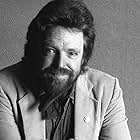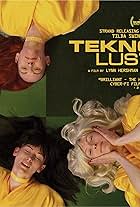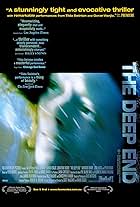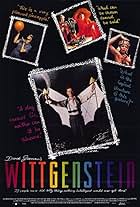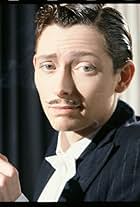Añade un argumento en tu idiomaEmmy Coer, a computer genius, devises a method of communicating with the past by tapping into undying information waves. She manages to reach the world of Ada Lovelace, founder of the idea o... Leer todoEmmy Coer, a computer genius, devises a method of communicating with the past by tapping into undying information waves. She manages to reach the world of Ada Lovelace, founder of the idea of a computer language and proponent of the possibilities of the "difference engine." Ada's... Leer todoEmmy Coer, a computer genius, devises a method of communicating with the past by tapping into undying information waves. She manages to reach the world of Ada Lovelace, founder of the idea of a computer language and proponent of the possibilities of the "difference engine." Ada's ideas were stifled and unfulfilled because of the reality of life as a woman in the ninet... Leer todo
- Dirección
- Guión
- Reparto principal
- Premios
- 1 nominación en total
Reseñas destacadas
A straightforward biopic of Ada Lovelace would have been worthwhile, but this film unfortunately makes a hash of both Lady Ada's life, and that of a modern-day computer scientist (and her broadly-drawn, doltish boyfriend).
I have to say that some of the commentary about this film is disappointing as well. Someone commented that Ada was like "Alan Turing with breasts" obviously this is a huge misconception of the accomplishments of both. Alan Turing created the worlds first universal machine. Ada, worked within the framework of "programming" Charles Babbage's engine. I wouldn't even compare her with Don Knuth, Dennis M. Ritchie or even Bjorn Stroustrop.
Maybe the Countess of Lovelace does deserve to have her story told, but this dear friends, is not it.
Maybe I just need to watch it again. A previous reviewer mentioned not to watch this film whilst being tired. Maybe that was my mistake.
I tried my best to enjoy this film, and there are aspects of it that I do like, but overall I found it amateurish and quite plodding.
Being somewhat of a self confessed computer nerd, I just can't help but pick up on the exact time frame when the movie was actually made, and how the employed graphics reflect that time (i.e. 1997). Having played games of the era c.f. "Mind Grind" to cite one example, this film cannot escape that 16-bit colour low res multimedia explosion of that time. Now thankfully this has somewhat lessened in more recent years in the gaming world at least, in favour of actual game play.
Having to resort to watching this movie via a German FTA satellite channel (as I don't think it's ever been aired on UK FTA TV, well not recently anyway), I was mildly amused to see the end credits note Gottdog (God dog) had 4 people working on it's design. Maybe it's mean spirited of me to be amused by this, given that ten years have elapsed since the movie was made, nevertheless the end result makes movie graphics from the eighties look good by comparison.
But, as for the main story, I agree that the format isn't the best idea. Like others I agree that Ada deserves a film without the sci-fi angle, and a more straightforward biographical approach would perhaps be better suited to covering the life story of this remarkable lady.
There are fundamental mistakes that undermine my enjoyment of this movie. First of all the underlying idea that somehow lost real-world information from the past can be accurately reconstructed through some sort of extrapolation via software based intelligent agents, seems somehow ludicrous.
Also, the theme running through the movie that a computing device can indeed predict the mechanics of all things through the course of time (e.g. the winds) is now known not to be the case.
OK, so the Victorians may have held this view, but the 20th century works of Gödel proving that no mathematical system can be complete, Turing's works on the limits of computability, not to mention chaos theory and quantum mechanics, have all completely undermined these ideas, which seem central to how the modern day researcher's software is supposed to work.
Finally, the clicking of the mouse in the air to mean "programming" is also just plain wrong, as previously mentioned.
This film maybe could have been OK, but at least some technical and scientific consultation would have given the film some much needed credit in the believability stakes.
I won't forget the film though, as like "Pi", it is clearly a unique work, but with too many fatal mistakes for me to truly enjoy it, 3/10 from me.
It's intriguing -- but NFE (Not For Everyone). Some might think it's too slow or seemingly just chatters and undramatic -- 'less you're a computer literate, -enthusiast, ever-fascinated by Tilda Swinton (no matter how long or short her appearance is), or simply love a film however it may be delivered. See it with an open mind (Empty your cache before you go).
There are nuances of little indications: a computer-minded person could very well be, at times, lacking in "real" emotions and feelings -- the human touches. E.g., Ada Byron King (Tilda Swinton) said to the main character Emmy, "Can you save me?" and Emmy (Francesca Faridany) said, "yes" and hit SAVE. Or, to take this further, one might see it as a comparison of then and now: what may seem difficult and impossible for a woman to break through barriers to be recognized (as the mathematical genius that Ada was) then, is fairly easy and accessible now, as Emmy hits a key and it's done -- she will be recognized for what she has researched, programmed and discovered!
Ah, there's some insights into the life of a computer couple -- some diet suggestions: they're presented as a certain COLOR day of the week, e.g., bananas are included on Yellow day, then there's BLUE day menu, WHITE day entree. (Are you curious?)
Written and directed by Lynn Hershmann-Leeson, it does feel like a story told from a woman's perspective. Definitely showed the "obsessive" pursuit of what the main character (perhaps autobiographical?) is after in her participation and wanting to succeed in this M.I.T. "ALIVE project".
You may say this is a love story -- love in different angles juxtaposed on the computer grids. There's also a dog of an interest called Charlene. Its ultimate gist of the whole event could be summed up in what Ada said -- that we should not be hung up in what she, the past, thinks and tried to immortalize her memory -- we need to move beyond and be in touch with the present and feel ALIVE and continue to discover things
When Emmy was talking with her mentor (Timothy Leary portrays) who appeared on the wall size screen, it brought to mind Dennis Potter's "Cold Lazarus" -- a stylish scientific tale with also an advance techno challenge theme of capturing a specific person's memory and "SAVE" -- keeping the memory ALIVE and recallable. The specific person is namely Albert Finney's character in the prequel "KARAOKE". If you enjoy Albert Finney and relish Dennis Potter's amazing storytelling, you must not miss "KARAOKE" nor "Cold Lazarus".
This film also reminds me of Douglas R. Hofstadter's books -- 1) "Metamagical Themas: Questing for the Essence of the Mind and Pattern (An Interlocked Collection of Literary, Scientific, and Artistic Studies)", and 2) his Pulitzer Prize winner "Godel, Escher, Bach: An eternal Golden Braid (A Metaphorical Fugue on Minds and Machines in the Spirit of Lewis Carroll)". There's also 3) Rudy Rucker's "The Fourth dimension -- A Guided Tour of the Higher Universes". All three are worthwhile books -- fun and intrigue -- if you're so like-mindedly disposed.
A caveat: If you're tired -- unless you're a computer "nerd" -- you probably don't want to view this movie yet, as the seemingly flat tone and leisurely pace until Tilda appears may not pick you up. If you're curious and patient, and you love the idea of what computers can do, go for it, this can be enjoyable and insightful for you.
Other Tilda Swinton gems that has more of her: "Orlando" 1992 written and directed by Sally Potter, and "Female Perversions" 1996 written and directed by Susan Streitfeld, both for mature audiences.
The film has a somewhat awkward framing device of a modern computer scientist who discovers a means of communicating with the past. Through the eyes of the modern scientist, we see the life of Ada Lovelace, the world's first computer programmer.
At times, the approach gives a feeling of nothing so much as a PBS or BBC low budget documentary on Lovelace's life, particularly the way in which it is divided up into snippets. Furthermore, the science behind the communication with the past is preposterous, and requires a serious suspension of disbelief. This is not hard science fiction, folks, despite the real world elements. The cameos by Timothy Leary are equally distracting, adding nothing to the plot.
However, both the woman who plays the modern scientist and Tilda Swinton manage to be engaging. The film is definitely worth a look.
¿Sabías que...?
- CuriosidadesA director's statement in the film's production notes says that the film was "structured around the idea of a double helix". "Every scene," the notes say, "was structured and shot using a DNA image as a model for actors' placement and camera movement."
- Citas
Ada Augusta Byron King, Countess of Lovelace: [her last words] Death makes the fragility of life delicious. In general, I'm not opposed to it.
- ConexionesReferences Engendro mecánico (1977)
Selecciones populares
- How long is Conceiving Ada?Con tecnología de Alexa
Detalles
Contribuir a esta página









